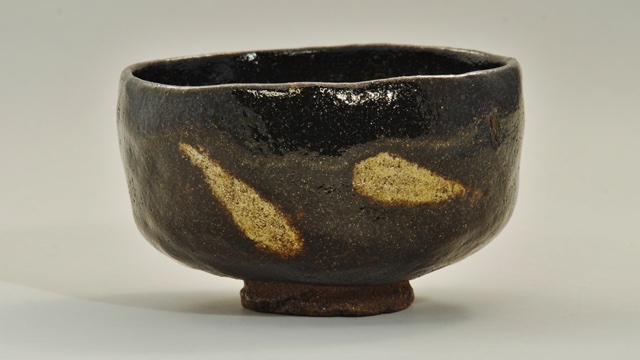
Kakuryu XIV said, "The tradition of the Raku family, which is passed down from one generation to the next, is to not teach.
"He said, "The tradition of the Raku family, which is passed down from generation to generation, is not to teach it. Even though the words "red" and "black" are used, there are different glaze tones and shavings for each generation.
Deep coloring
Handmade feel
Excellent heat retention
Beautiful shape
Durability
These characteristics make for an enjoyable tea experience. It can also be used in combination with lacquerware and charcoal ware for a variety of occasions.

Important Cultural Property: A black raku tea bowl made by Chojiro, the first generation of the Raku family, and one of the seven types of Chojiro.
It is called Daikoku because of its large shape.
It was owned and named by Rikyu, passed down as Shoan, Sotan, and later entered the Konoike family through Shosai Goto, Koshin, the fourth head of Omotesenke, and Josei Mitsui.

The bowl is shaped like a horse and has a strong step at the waist. It is similar to the black Oribe Kutsugata tea bowl that became popular in Mino from the first half of the Keicho era. The overall construction is thick, and the mouth is made round. The base is carved out into a round shape, and a rakuji mark is stamped in the center of the base. The seal stamped in the center of the foot is called the Jokei seal, which is different from the stamp stamped on the tea bowls in the previous drawings. Alternatively, this seal may have been given to Jokei by Hidetada. On the back of the box lid, Joshinsai wrote "Second generation Kuro tea bowl Hototogisu (flower stamp)".

Important Cultural Property "Aoyama" is an extremely novel work among Doyu's works, with bright yellow abstract crests drawn on glossy black glaze. Raku family 3rd generation Doyuu has been affectionately known as Nonkau. A little over three generations after Chojiro, Doinyu is creating an innovative and modern world. Some of the works of Raku family founder Chojiro and Honami Koetsu have been designated as important cultural properties, but among the Raku generations excluding Chojiro, the third generation Doyuu's work was the first to be designated as an important cultural property. becomes.

A figure holding a spear or a balance pole, with a bundle of firewood on the back. Such specific patterns are rare, especially those depicting people. It is also known that many of Rakuichi's works are unmarked, and there are very few tea bowls in India. In addition, although there are few existing boxes, we started with one box.